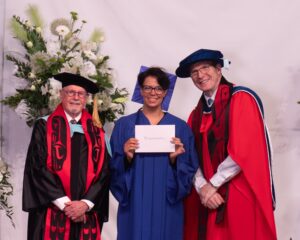I remember sitting in my psychiatrist’s office and feeling numb and tingly all over as feelings of relief, guilt, and anger washed over me. My psychiatrist and I had finished going over the results of my psychoeducational assessment, and she matter-of-factly said, “you have inattentive attention deficit hyperactivity disorder.”
“You mean all the struggling I’ve gone through… It isn’t my fault, none of this is my fault?” I anxiously asked her.
“No, you just have a unique brain that makes life a lot harder for you,” she said, “especially in school.”
I had struggled with my grades in school, and after failing out of college in my early 20s, I gave up, thinking I was too stupid and lazy to succeed. As it turns out, I wasn’t stupid or lazy—I just had a brain that was wired differently and couldn’t thrive in a typical academic setting.

Receiving my ADHD diagnosis ended up being the key to unlocking my academic potential, but the journey to that diagnosis would force me to confront and overcome years of disappointment and failure.
Two years before my diagnosis, I was working low-wage jobs and had grown tired of scraping by, and I decided I wanted a change. I started applying for local administration positions, but was repeatedly turned down because I lacked relevant post-secondary credentials.
I had attempted college 13 years earlier, but I flunked out after only two years due to troubles with procrastination, staying organized, and time management (all major symptoms of inattentive ADHD, unbeknownst to me at the time).
I was terrified to go back to college, convinced I was going to fail again, but I saw no other way of bettering my life. So, I took a leap of faith and registered for the Office Administration program at Camosun College.
I quickly found myself enjoying the classes and the course content, but the heavy class workload and my lack of focus and disorganization threatened to derail me again. I had to put in double the effort to succeed, and the strain to keep up was starting to take its toll.
To decompress after class, I turned to social media and stumbled upon a video of a woman my age sharing her ADHD symptoms like procrastination, lack of focus, and internalized feelings of failure. These were the same symptoms I experienced, and a lightbulb went off in my head. What if I also had ADHD?
I decided to reach out to my mother to share what I had learned about ADHD and how I thought the symptoms of ADHD explained my poor performances in school.
“This definitely sounds like you,” she agreed, “but this sounds exactly like me too.” The more we discussed our experiences, the more she realized that she likely had ADHD too.
Being female meant my mother and I weren’t likely to be considered for an ADHD diagnosis during childhood, as girls with ADHD usually present with lesser-known inattentive symptoms, compared to stereotypical hyperactive boys with ADHD.
The Centre of ADHD Awareness Canada estimates that boys are three times more likely to be diagnosed with ADHD than girls and that up to 75 percent of girls with attention issues have undiagnosed ADHD.
I took my new knowledge about ADHD and pursued a psychoeducational assessment, and in the fall of 2022, I received my formal inattentive ADHD diagnosis. My college listed ADHD as a permanent disability, so I could now apply for government funding, and academic accommodations like extra time on tests, tutoring, and extensions on assignments.
I finally had the supports I needed to excel academically, and after two years of hard work, I graduated with honours and a 4.0 GPA, a feat I never thought myself capable of previous to my diagnosis.
My ADHD diagnosis was the best thing that could have happened to me. It allowed me to accept myself and understand that all those years of struggle and failure were not because I wasn’t smart and didn’t try hard enough. It was because my uniquely wired brain needed extra support to excel, and excel I did.
